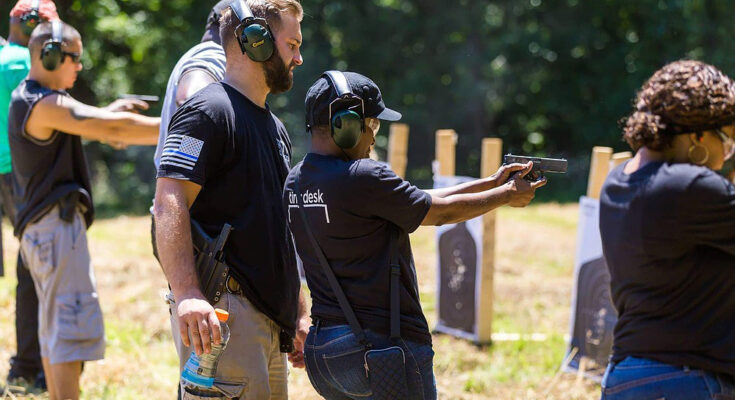When it comes to carrying a concealed firearm, individuals have the option to obtain either a multi-state concealed carry permit or a single state permit. Each option has its advantages and considerations, depending on an individual’s needs, travel habits, and legal requirements. PTPGun, a reputable firearms training organization, aims to provide guidance in choosing the right type of permit. In this article, we will discuss the differences between multi-state and single state permits, explore the benefits and considerations of each, and answer frequently asked questions to help individuals make an informed decision.
Multi-State Concealed Carry Permit:
Increased Travel Flexibility:
One of the main advantages of a multi-state concealed carry permit is the ability to carry concealed in multiple states. This is particularly beneficial for individuals who frequently travel or have residences in different states. It eliminates the need to research and apply for individual permits in each state.
Legal Requirements:
Obtaining a multi-state concealed carry permit often requires meeting stricter eligibility criteria, including completing comprehensive background checks and additional training. This ensures that individuals who hold such permits have undergone rigorous screening processes and possess the necessary knowledge and skills for responsible concealed carry.
Reciprocity:
Multi-state permits typically have reciprocity agreements with numerous other states. This means that the permit is recognized and accepted in those states, allowing legal concealed carry across state lines. However, it is essential to research and understand the specific reciprocity agreements and any limitations or restrictions imposed by individual states.
Single State Concealed Carry Permit:
Focused on State-Specific Laws:
A single state concealed carry permit is tailored to the specific laws and regulations of a particular state. It ensures compliance with the state’s requirements and allows individuals to carry concealed within that state. This option is suitable for individuals who primarily reside in and travel within a single state.
Simplicity and Ease of Application:
Obtaining a single state permit may be less complicated and require fewer steps than obtaining a multi-state permit. The application process and requirements are typically designed to align with the laws and regulations of that specific state.
Familiarity with Local Laws:
By holding a single state permit, individuals can develop a deeper understanding of the laws and regulations pertaining to concealed carry within that state. This allows them to stay updated on any changes and ensures compliance with local regulations.
FAQs (Frequently Asked Questions):
Q1. Which states offer multi-state concealed carry permits?
Several states offer multi-state concealed carry permits, such as Utah, Florida, and Virginia. However, it is important to note that not all states recognize permits from other states, even if they have reciprocity agreements. Researching the specific laws and requirements of each state is crucial before considering a multi-state permit.
Q2. Can I switch from a single state permit to a multi-state permit?
Yes, it is possible to transition from a single state permit to a multi-state permit if you meet the eligibility requirements of the state issuing the multi-state permit. However, this process varies depending on the state and its laws. It is recommended to consult with relevant authorities or seek legal guidance to understand the specific procedures involved.
Q3. Does a multi-state permit guarantee concealed carry in all states?
No, a multi-state permit does not guarantee concealed carry in all states. While many states have reciprocity agreements with each other, there are exceptions, limitations, and individual state regulations to consider. It is crucial to research the reciprocity agreements and any additional requirements or restrictions imposed by each state.
Q4. Can a multi-state permit holder carry in federal buildings and private property?
Even with a multi-state permit, carrying a concealed firearm in federal buildings or private property is subject to additional restrictions and regulations. Federal buildings typically have their own security protocols, while private property owners have the right to restrict firearms on their premises. It is important to respect and adhere to these regulations when carrying concealed.
Q5. Are there additional training requirements for a multi-state concealed carry permit?
Yes, multi-state concealed carry permits often require additional training beyond the standard requirements for a single state permit. This training may cover topics such as interstate travel laws, firearm transportation, and understanding the legal responsibilities associated with carrying concealed in different jurisdictions.
Conclusion:
Choosing between a multi-state concealed carry permit and a single state permit depends on an individual’s travel habits, legal requirements, and preferences. A multi-state permit offers increased travel flexibility and recognition in multiple states, but may come with stricter eligibility criteria and additional training requirements. A single state permit is tailored to a specific state’s laws and regulations, providing simplicity and familiarity with local laws. It is important to research the laws of the states involved, understand reciprocity agreements, and comply with all regulations and requirements. PTPGun recommends seeking professional guidance and training to ensure safe and responsible concealed carry, regardless of the type of permit obtained.



